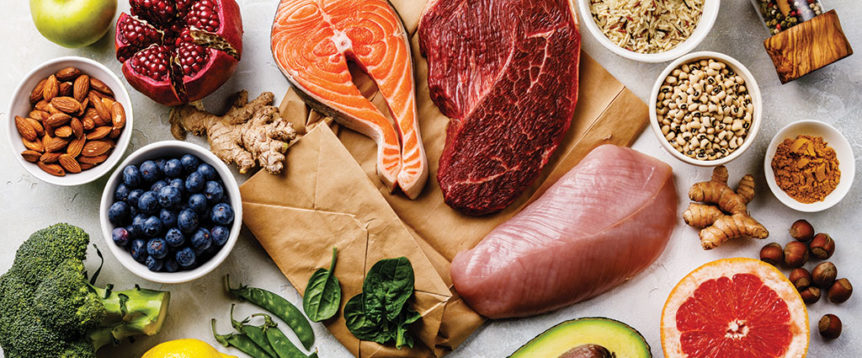Although it’s appealing to think of cancer-fighting foods that might wholly prevent or treat cancer, they unfortunately don’t exist. However, eating healthy foods can reduce one’s risk of cancer, says Geovanni (Geo) Espinosa, N.D., L.Ac., C.N.S., from New York University’s Langone medical center and author of Thrive Don’t Only Survive: Dr. Geo’s Guide to Living Your Best Life Before & After Prostate Cancer (CreateSpace, 2016).
The statistics are sobering: One in two men and one in three women in the U.S. will be diagnosed with some form of cancer in their lifetimes. According to the American Cancer Society, the disease is the second most common cause of death in the U.S., exceeded only by heart disease.
For decades, Espinosa has been treating men for prostate cancer and helping them reduce their risk through lifestyle changes.
“It’s essential to create a microenvironment that is hostile to cancer and build the type of eating lifestyle you need to combat age-related diseases,” Espinosa says. He emphasizes eating foods containing abundant healthy fats, antioxidants and colorful phytochemicals. Following is Espinosa’s list of the top types of foods to reduce cancer risk that you can easily add to your diet.
 Cruciferous Vegetables
Cruciferous Vegetables
Crunchy, peppery, bitter and hearty vegetables—like arugula, bok choy, broccoli, brussels sprouts, cabbage, cauliflower, collard greens and kale—are the best foods to reduce cancer risk. Why? They contain tongue-twister nutrients called glucosinolates, such as sulforaphane and 3,3’ diindolylmethane, which are biologically active compounds that, according to research, block cancer-activating enzymes. They are particularly valuable for reducing breast, prostate, bladder and skin cancer risks by lowering inflammation, helping to induce cancer cell death and removing carcinogens.
 Healthy Fats from Fish, Seeds & Nuts
Healthy Fats from Fish, Seeds & Nuts
To lower your cancer risk, reducing inflammation by consuming foods with essential fatty acids is a good place to start. These healthy fats affect cell signaling, cell membrane structure and fluidity, all of which modulate inflammation.
Cold-water fish—such as wild salmon, mackerel, herring, oysters and sardines—contain essential fatty acids called DHA and EPA (docosahexaenoic acid and eicosapentaenoic acid) that can be derived only from diet. Research has shown that plant sterols, as well as polyunsaturated and monounsaturated fats, in nuts, seeds and avocados, all reduce inflammation.
 Herbs and Spices
Herbs and Spices
Research continues to demonstrate that colorful phytochemicals in spices like turmeric, allspice, cinnamon, garlic, saffron, chiles, oregano, fenugreek, cardamom and ginger contain bioactive compounds that may inhibit cancer cell formation and migration.
For instance, turmeric contains properties that regulate hormones or hormone receptors that lower risk of breast, prostate and lung cancers. Ginger and garlic reduce the risk of digestive cancers. The benefits are too numerous to list here, but medical experts recommend consuming fresh and dried spices and herbs daily.
Testing and Cancer Prevention
According to the American Cancer Society, screening can prevent colorectal and cervical cancers by detecting precancerous lesions that can be removed. Screening can also detect some cancers early, when treatment is more often successful. Screening is known to reduce mortality for cancers of the breast, colon, rectum, cervix, lung (among current or former heavy smokers) and probably prostate. In addition, being aware of changes in the body, such as the breast, skin, mouth, eyes or genitalia, and bringing these to the attention of a health care professional, may also result in early cancer detection.


 Cruciferous Vegetables
Cruciferous Vegetables  Healthy Fats from Fish, Seeds & Nuts
Healthy Fats from Fish, Seeds & Nuts  Herbs and Spices
Herbs and Spices